
On 24 January 2022 COL hosted the second meeting of the High-Level Panel on Climate Change and Education. The focus was on concrete actions that COL can take to support Member States in advancing climate action (through policy, capacity, resources and research).
At the meeting, Professor Asha Kanwar, COL President & CEO, was joined by Dr Rolph Payet, Executive Secretary, Secretariat of the Basel, Rotterdam, and Stockholm Conventions, United Nations Environment Programme Geneva, former Minister for Environment and Energy in the Seychelles (Chair); The Honourable Lady Howard Mabuza, Minister of Education & Training, eSwatini; The Honourable Ms Premila Kumar, Minister of Education, National Heritage & Arts, Fiji; Dr Arjoon Suddhoo, Deputy Secretary General, Commonwealth Secretariat; Ms Vibeke Jensen, Director, Division of Peace and Sustainable Development, Education Sector, UNESCO, representing Ms Stefania Giannini, ADG for Education; Dr Tao Zhan, Director – UNESCO Institute for Information Technologies in Education; and Dr David Atchoarena, Director – UNESCO Institute of Lifelong Learning.
Key discussion areas included teacher capacity building, e-learning strategies for disaster response, development of OER in support of climate change education, lifelong learning on climate change, and the importance of multi-sectoral and multi-partner collaboration.
In her welcome remarks, Professor Kanwar sought inputs to COL on action areas based on country priorities. A draft structure of a report from the panel would be discussed as well. The report would be sent to the Commonwealth Ministers of Education in June 2022.
The panelists mentioned their emerging priorities where COL’s partnership and support would be beneficial. Hon. Lady Mabuza identified the development of ICT infrastructure in rural Eswatini as a priority in education along with building teachers’ capacities. Hon. Premila Kumar highlighted the importance of developing nature-based solutions for small island states while advocating bringing about behavioral change through new curricula. Dr Suddhoo emphasised the urgency of practical action. The UNESCO officials talked about the need to integrate cultural and justice dimensions along with all types of learning, including non-formal learning. There was a suggestion that COL could foster an alliance for green education. The Chair brought forward the importance of indigenous knowledge systems in adapting to climate change. He also spoke of the need to address the report to other relevant ministries as well.
The panel gave specific suggestions to COL on the structure of the report to be finalised at the next panel meeting in May 2022. Professor Kanwar thanked the members for their advice and inputs.


